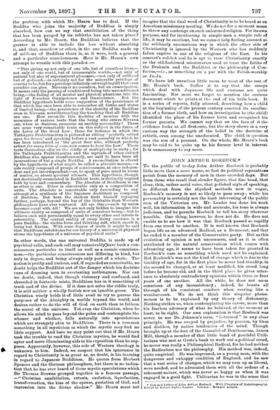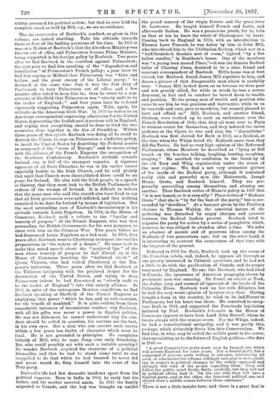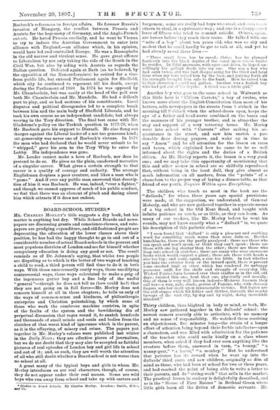JOHN ARTHUR ROEBUCK.*
To the public of to-day John Arthur Roebuck is probably little more than a were name, so fast do political reputations perish from the memory of men in these crowded days. But from those who recall that slender figure, that fine head, that clear, thin, rather acrid voice, that polished style of speaking, so different from the slipshod methods now in vogue, Roebuck's memory is not so likely to pass away ; while his personality is certainly not the least interesting of the public men of the Victorian era. Mr. Leader has done his work well, his information is wide and accurate, his tone is always judicious, and he permits Roebuck to tell his story wherever possible. One thing, however, he does not do. He does not enable us to see how it was that Roebuck passed so rapidly from one creed to another. It is well known that Roebuck began life as an advanced Radical, as a Democrat, and that he ended it a member of the Conservative party. But as this evolution of opinion is not uncommon, and as it is often attributed to the natural conservatism which comes with advancing age, it seems to have been taken for granted in Roebuck's case as something which need not be explained. But Roebuck's was not the kind of change which is due to the timidity of age, for in the first place he never bad timidity, in the second he changed, or at least modified, his creed long before he became old, and in the third place he gives utter- ance to absolutely contradictory opinions within three or four years of one another. All the while, he does not seem conscious of any inconsistency ; indeed, he boasts all through of his consistent conduct when veering like a weather-cock. We do not think this singular pheno- menon is to be explained by any theory of dishonesty. Nothing strikes us, when contemplating his career, more than his fearless advocacy of what he believed, at the moment at least, to be right. Our own explanation is that Roebuck was never, to use Dr. Johnson's term, " bottomed " in any clear principle. He was swayed by prejudice, by passion, by likes and dislikes, by native tendencies of the mind. Though brought up at the feet of the Gamaliel of Benthamism, James Mill, though a member of that little band of youthful Utili- tarians who met at Grote's bank to work out a political creed, he never was really a Philosophical Radical, for he had neither the Radicalism nor the philosophy. His method was, indeed, quite empirical. He was impressed, as a young man, with the dangerous and unhappy condition of England, and he saw that a vast series of changes, which we may sum up as liberal, were needed, and he advocated them with all the ardour of a vehement nature, which was never so happy as when it was engaged in a good fight. Utilitarian he was in the sense that e Life and Letters of John Arthur Ramat. With Chapters of Autobiography. ruiit,vi h. Rnhert ILluinn Lawlor. TenuLtua Zavard Arnold. utility governed his political action ; but that he ever held the complete creed as held by Mill, e.g., we see no evidence.
The inconsistencies of Roebuck's conduct, as given in this volume, are indeed startling. Take his attitude towards three or four of the leading questions of his time. In ]855 it was on a Motion of Roebuck's that the Aberdeen Ministry was thrown out of office, and Palmerston became Prime Minister, being supported in his foreign policy by Roebuck. Two years after we find Roebuck in the coalition against Palmerston ; the next year we find him speaking of the " degradation and humiliation " of Palmerston's French policy; a year later we find him saying at Milford that Palmerston was " false and hollow, and the great enemy of the Liberal party;" he
declared at the same time that it was the first duty of Parliament to turn Palmerston out of office, and a few months after voted to keep him in ; then he wrote to a con- stituent at Sheffield that Palmerston was "utterly unfit to be the leader of England ; " and four years later he is found vigorously supporting Palmerston again. Take, again, his attitude on the American Civil War. In 1859 he writes to an American correspondent expressing admiration for the United States, deprecating the foolish anti-American talk in England, and urging that everything should be done to bind the two countries close together in the ties of friendship. Within three years of this epistle Roebuck was doing all he could to destroy the Union, to urge on Palmerston a vindictive policy, to insult the United States by describing the Federal armies as composed of the "scum of Europe," and to secure along with the alliance of the French Emperor the recognition of the Southern Confederacy. Roebuck's attitude towards Ireland, too, is frill of the strangest vagaries. A vigorous opponent of all State Churches, he was in his earlier career especially hostile to the Irish Church, and he said plainly that until that Church were disestablished there could be no peace for Ireland. He also told the Irish people, in a speech at Galway, that they must look to the British Parliament for redress of the wrongs of Ireland. It is difficult to believe that the same man who said this should also have lived to say that all Irish grievances were self-inflicted, and that nothing remained to be done for Ireland by means of legislation. But the most astounding case of Roebuck's inconsistency is his attitude towards Louis Napoleon. In 1854, in the House of Commons, Roebuck paid a tribute to the "loyalty and honesty of purpose" of the French Emperor, who was then persuading the British Government, for his own purposes, to enter with him on the Crimean War. Two years before he had denounced Louis Napoleon as a bad man. In 1858, four years after, Roebuck went to Cherbourg to inspect the warlike preparations in " the waters of a despot." He came back to make that noted speech about the "perjured lips" of the man whose honesty of purpose he had dilated on in the House of Commons touching the "hallowed cheek " of Queen Victoria, who had visited Cherbourg at the Em- peror's invitation. Three years after we find Roebuck at the Tuileries intriguing with the perjured despot for the destruction of the United States, and trying to drag Palmerston (whom he had denounced as "utterly unfit to be the leader of England ") into this unholy alliance. In 1865, in spite of the outrageous Mexican expedition, we find Roebuck speaking at Sheffield of the French Emperor as employing that power "which he has, and so well exercises, for the benefit of mankind." It is quite evident from these remarkable instances of inconsistent conduct why Roebuck, with all his gifts, was never a power in English politics. He was not dishonest, he cannot understand why his con- duct should be called in question, his motives are the best, in his own eyes. But a man who can execute such curves within a few years has faults of character which must be fatal. He is not grounded in principles. He complains bitterly of Mill, who, he says, flung over early friendship. But who could possibly act with such a variable quantity? No wonder Roebuck acquired the character of a political Ishmaelite, and that he had to stand alone until he was compelled to do that which he had boasted he never did and never would do, fling himself into the arms of the Tory party.
Roebuck's life had few dramatic incidents apart from his political vagaries. Born in India in 1802, he early lost his father, and his mother married again. In 1815 the family migrated to Canada, and the boy was brought up amidst the grand scenery of the virgin forests and the great river St. Lawrence. He taught himself French and Latin, and afterwards Italian. He was a precocious youth, for he tells us that at ten he knew the whole of Shakespeare by heart. Coming back to England in 1824, with an introduction to Thomas Love Peacock, he was taken by him to John Mill, who introduced him to the Utilitarian Society, which met in a "half-furnished, desolate sort of room," lighted "by a few tallow candles," in Bentham's house. One of the members was "a young man named Place,"—it was the famous Radical tailor of Charing Cross, destined to be a close friend and constant correspondent of Roebuck. Mill's home was at first visited, but Roebuck found James Mill repulsive to him, and draws a picture of that disagreeable man which is probably true. " James Mill looked down on us because we were poor and not greatly allied, for while in words he was a severe democrat, in fact and in conduct he bowed down to wealth and position. To the young men of wealth and position who
came to see him he was gracious and instructive, while to us he was rude and curt, gave us no advice, but seemed pleased to
hurt and offend us." Mill, Roebuck, and another friend, Graham, were worked up to such an enthusiasm over the French Revolution of 1830, that they all went over to Paris to witness events for themselves, and they induced the entire audience at the Opera to rise and sing the " Marseillaise." Roebuck was first elected for Bath in 1832, as a Radical, at the time when the Whigs hated the Radicals more than they did the Tories. He had no very high opinion of the Reformed Parliament, whose Members he described as "lying at full length on the benches, talking, laughing, hooting, coughing, sleeping." He ascribed the confusion to the break-up of the old Tory and Whig organisation under the stress of the new regime. We find a not very attractive picture of the inside of the Radical party, although it contained really able and powerful men like Molesworth, Joseph Hume, Grote, and Roebuck himself. They are per- petually quarrelling among themselves, and abusing one another. Thus Roebuck writes of Hume's policy in 1837 that " it is not honest, or it is very silly." Place writes of " Madame Grote " that she is "by far the best of the party," but is sur- rounded by " dawdlers." At a banquet given by the Finsbury electors to Thomas Wakley, the convivial nature of the gathering was disturbed by angry charges and quarrels between the Radical leaders present. Roebuck tried to organise the party for action by a series of pamphlets, which, however, he was obliged to abandon after a time. We infer an absence of morale and of generous ideas among the Radicals of two generations ago; but on the other hand, it is interesting to contrast the earnestness of that time with the languor of the present.
Defeated in 1837 for Bath, Roebuck took up the cause of the Canadian rebels, and, indeed, be appears all through as one greatly interested in Colonial questions, and he had not a little to do with the pacification of Canada and its proper treatment by England. To one like Roebuck, who had lived in Canada, the ignorance of American geography shown by prominent men was amazing. He found, on circuit at York, the Judge, jury, and counsel all ignorant of the locale of the Columbia River. Roebuck took up law with diligence, but he had the very worst opinion of lawyers as a class. Having bought a farm in the country, he tried to be indifferent to Parliament, but his heart was there. He contrived to recap- tare Bath in 1841, and supported the Free-trade legislation
initiated by Peel. Roebuck's We-noire in the House of Commons appears to have been Lord John Russell, whom be treats always with the utmost scorn. For the Whigs, indeed, he had a constitutional antipathy, and it was partly this, perhaps, which ultimately drove him into Conservatism. We find him, in what may be called the middle point in his career,
thus speculating as to the future of English politics,—the date is 1849 :—
" A great Conservative party must soon be formed, one which will govern England for some years. Not a feudal party, but a compound of persons quite willing to advance, introducing all sorts of administrative reforms willingly and proprio motu, yield- ing in respect to political changes to the widely expressed and strongly felt wish of the people regarding them. They will follow the public mind freely, fairly, cordially, but they will not in political affairs lead it. On the one aide, they will have a bigoted party, and on the other, the fanatical political one, and should steer a middle course between these extremes."
There is not a little insight here. and there is a great deal in Roebuck's references to foreign affairs. He foresaw Russia's invasion of Hungary, the conflict between Prussia and Austria for the hegemony of Germany, and the Anglo-French entente. He hated Prussia cordially, and he went to Vienna to try to induce the Austrian Government to enter into alliance with England,—an alliance which, in his opinion, would have led and controlled Europe. He was a Russophobe in the old narrow and virulent sense. He gave great offence to Liberalism by not only taking the side of the South in the Civil War, but also by siding with Austria as regards the Italian question. Defeated again at Bath (as he believed, by the opposition of the Nonconformists) he retired for a time from public life, but entered Parliament again for Sheffield, which city he continued to represent till his death, except during the Parliament of 1868. In 1874 he was opposed by Mr. Chamberlain, but was easily at the head of the poll over both Mr. Chamberlain and Mr. Mundella. He had a difficult part to play, and so had sections of his constituents. Local disputes and political divergencies led to a complete break between him and the main body of Sheffield Liberals, and he took his own course as an independent candidate, but always veering in the Tory direction. The final test came with Mr. Gladstone's policy on the Turkish question in 1877-78, when Mr. Roebuck gave his support to Disraeli. He also flung out Charges against the Liberal leader of a not too generous kind ; 'ant generosity was never one of Roebuck's virtues. In 1878 the man who had declared that he would never submit to be "whipped," gave his arm to the Tory Whip to enter the Lobby. His independence was gone.
Mr. Leader cannot make a hero of Roebuck, nor does he pretend to do so. He gives us the plain, unadorned narrative of a singular career. What gives a certain strength to that career is a quality of courage and audacity. The average Englishman despises a poor creature, and likes a man who is " game." And if ever any public man answered that descrip- tion of him it was Roebuck. He was, indeed, "ever a fighter," and though we cannot approve of much of his public conduct, we feel that there was an element of pluck and daring about him which attracts if it does not endear.
























































 Previous page
Previous page